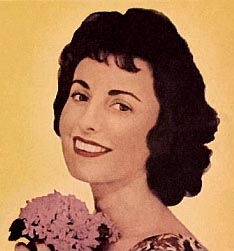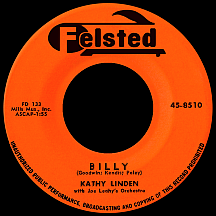KATHY LINDEN
Billy
The late '50s recordings of Burlington, New Jersey singer Kathy Linden would certainly be considered "oldies" in the overall scheme. Her first two hits even fit that classification when they were new, both dating back another four decades! "Billy" had been written in 1911 by Joe Goodwin, James Kendis and Herman Paley (each going on to score several more hits with various collaborators during the second decade of the century); Billy Murray's American Quartet debuted the tune on Victor Records that same year. "You'd Be Surprised," an Irving Berlin composition featured in the Broadway musical Ziegfeld Follies of 1919, became one of Eddie Cantor's two dozen hit records, as did versions by New Yorker Irving Kaufman and the All-Star Trio, all in 1920. Each of these songs, and one other, were revived in the late '30s and provided a direct link between Linden and a popular female vocalist of that time.
"Oh Johnny, Oh Johnny, Oh," an Abe Olman-Ed Rose number from the 1916 Broadway musical Follow Me, had been a number one hit in the summer of '17 for the American Quartet and one of the biggest hits for musical star Elizabeth Brice at the same time. In 1939, bandleader Orrin Tucker made an impact on pop culture with Texas-born vocalist Bonnie Baker; a number two hit on Columbia that fall, "Oh Johnny" exposed her sweetly innocent, youthful voice to millions and made her an "overnight" star (though she'd been singing with Tucker's band for about three years). Several hits followed including "Billy," a Vocalion recording from several months previous, and "You'd Be Surprised" in early 1940, as the nickname "Wee" Bonnie Baker became a lasting one.
Kathy Linden was born in 1938, a little late to experience Wee Bonnie's distinctive sound first-hand (that is, unless her parents played the phonograph right next to the cradle). Kathy developed an early interest in music, danced ballet-style on stage at age four, took piano lessons during first grade and sang for an audience a few years later, then gravitated towards the violin and spent her high school years playing and singing with a string quartet. Next stop: the Philadelphia Conservatory of Music, in the hopes of one day having a career playing with symphony orchestras. While singing in small restaurants and clubs to pay for school, she connected with Joe Leahy of National Records, who produced her studio recording of "It's Just My Luck to Be Fifteen," a fall '57 teen ballad (written by Canadian trumpeter Johnny Cowell) that had already been released without fanfare by the as-yet-hitless Poni-Tails. The B side of Kathy's single, "The Touch of Love" (penned by Ross Bagdasarian, a.k.a. "Witch Doctor" chart-topper David Seville), was from the auto racing film The Devil's Hairpin. Would Miss Linden's violin be put on the shelf for good?

Kathy's cute-voiced take on "Billy" came about when Leahy (who did the 'Bum-bum-bum, bum-bum-bum-bum' backing vocal) insisted she sing in a higher-voiced style similar to Baker's. The disc, on the recently-established Felsted label, was a top 20 seller and top ten in radio airplay during the spring of 1958. Kathy sang it (or sometimes lip-synced) on all the top television shows and her less-serious-than-a-concert-violinist career was under way. "You'd Be Surprised" (released in spite of a more recent version by Marilyn Monroe, who'd stamped her trademark on the song a few years earlier), milked the Wee Bonnie gimmick and reached the top 50 in June. One of the network shows she'd guested on was Steve Allen's Sunday night soirée; he wrote the liner notes for her album That Certain Boy, comparing her vocal approach to a "...curly-haired, daddy's-little-flirt little girl" while pointing out she was actually a "...big beautiful girl of 19" and was "...about to become a mother." Stop the presses!
Striking out on her third swing at Wee Bonnie Baker, "Oh Johnny, Oh Johnny, Oh," Kathy and Joe wisely decided to go with more timely material. "Kissin' Conversation," a cute song with a well-placed 'Ooh-ooh,' faced competition from a version on MGM by Toni Carroll; neither charted. It seemed momentum had been lost. She employed a strange tactic with the next single, introducing herself by full name as an intro to "Somebody Loves You." If that counts as a desperate move, it wouldn't be her last. Then fortune smiled upon Kathy in the spring of '59 with "Goodbye Jimmy, Goodbye," a somber ballad written by Jack Vaughn, a deejay/production director at WNAX in Yankton, South Dakota (one of the westernmost radio stations in America with a "W" call sign). Kathy's recording nearly matched the chart peak of the year-old "Billy" and was covered successfully in Britain by Ruby Murray. Vaughn never penned another hit song and didn't even leave Yankton; soon after he was promoted to program director.
"You Don't Know Girls," Kathy's most contemporary teen tune yet, made a brief chart appearance in Billboard while its tranquil flip side, "So Close to My Heart," did the same on the Cash Box chart. After one more 45, "Mary Lou Wilson and Johnny Brown," she left Felsted and signed with Fred Foster's Monument label, recording in Nashville in an attempt to carve out a country career. Irving Gordon's "Allentown Jail," her first effort recorded at RCA's Studio B in early 1960, offered a pop vocal set to a slow country arrangement (prominent steel guitar!); Boudleaux and Felice Bryant's "The Willow Weeps" told a softly similar western tale. A slight country twang is evident on the uptempo "Take Me Home (To My Lover)," penned by Don Gibson. Nothing seemed to click. Another by the Bryants was "Take Me Home, Jimmy." But rehashing one's hits, however fresh a song may seem, is not the best strategy.
Leaving Monument, she had a summer '61 single on RPC, an L.A.-based label run by Joe Leahy; "Billy is My Boy Friend," a novelty number reminiscent of her breakthrough hit, had an original ballad composed by Kathy, "Put This Ring on My Finger," on its flip. Capitol Records took a shot with her in 1962. Working with hot Hollywood producer Nick Venet, she grappled with pop and country material; two of her three Capitol releases were "Remember Me (To Jimmy)" (guess what song it sounds like) and...get ready..."Jimmy." And her recording career was essentially over. She was capable of much more, limited by the weak material of her post-Felsted years. But life has been good for Kathy Linden; she raised a family and continued writing songs while playing several instruments and singing, though unfortunately not very often in public.


